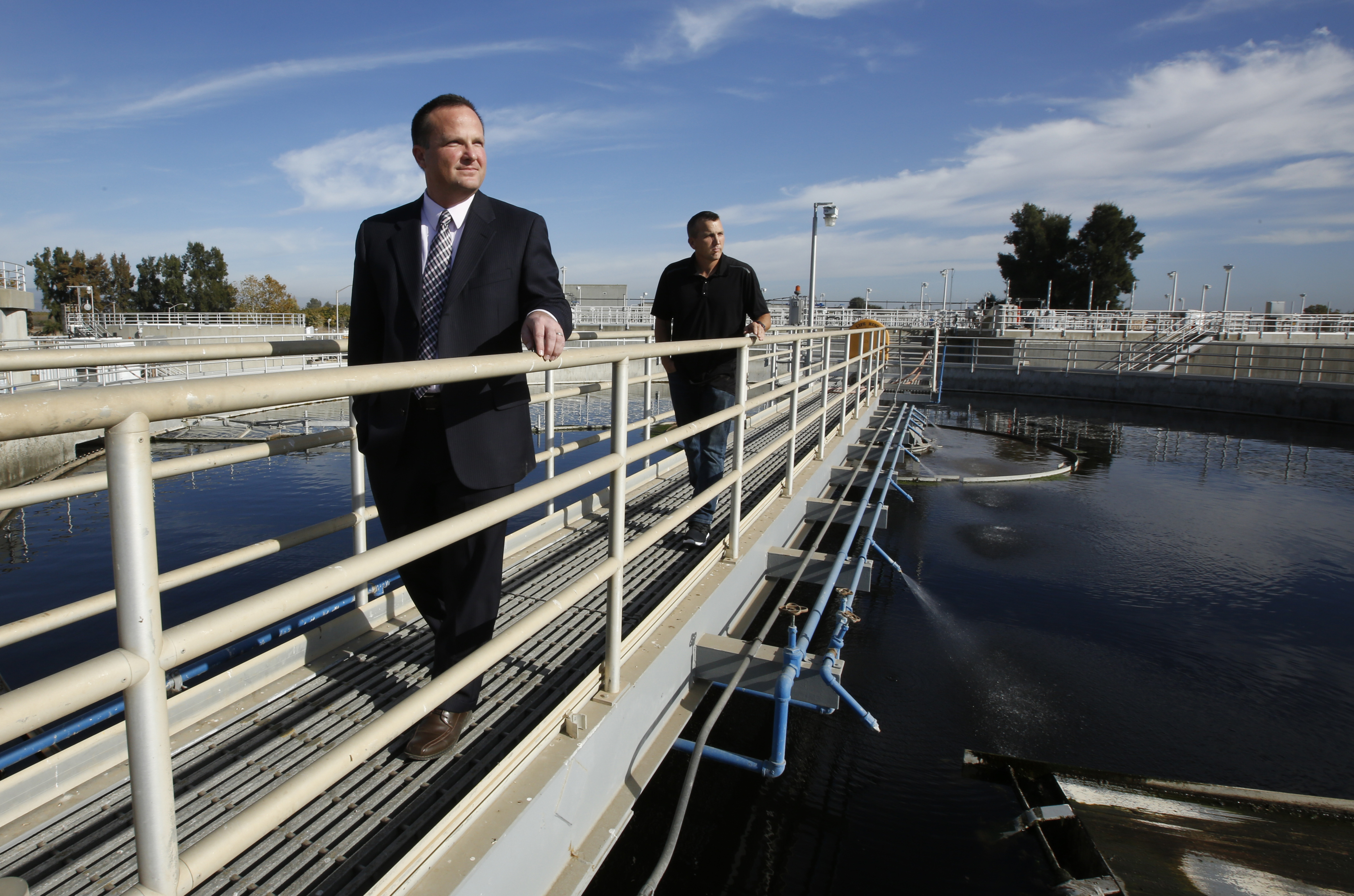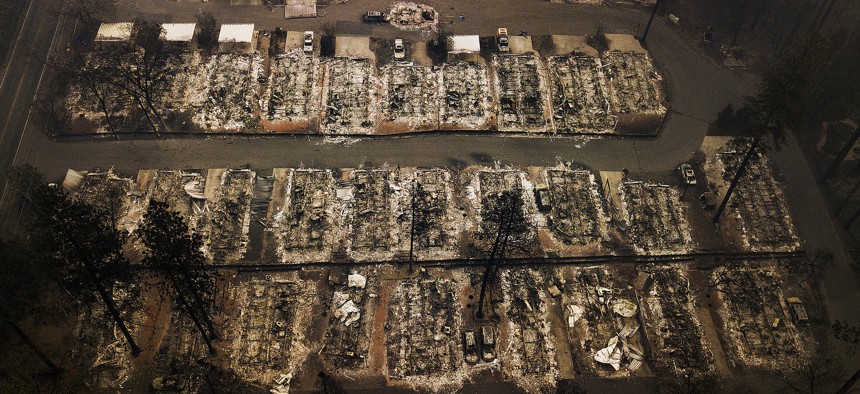Connecting state and local government leaders
Officials say the city of Chico is strained by the influx of newcomers displaced by last year’s Camp Fire—but as a place untouched by wildfires, they aren't eligible for emergency funds to help with the sudden population growth.
The California Camp Fire of 2018 burned for 17 days. In that time, the worst wildfire in state history killed 85 people and displaced 50,000 more, consumed more than 150,000 acres of land, and destroyed 18,000 buildings, including a hospital, multiple schools, and scores of homes.
One of the towns hardest hit was Paradise, which was burned almost entirely to the ground. With 11,000 houses gone in a matter of days, most residents were left homeless. Many of them moved just a few miles west, to the nearby city of Chico, which was untouched by fire.
Within a few days of the fire, the Northern California city added over 19,000 new residents—representing a 20% increase in their population. “It was an astounding scenario that no one was expecting,” said City Manager Mark Orme. “We absorbed a whole other city.”
The city of 112,000—the population figure with the new residents factored in—has since struggled to accommodate this growth, as officials believe that most new residents are there to stay. A year after the fire, only 11 homes, or .1% of those destroyed, have been rebuilt in Paradise. Orme said rebuilding has only been an option for a select few. “Those without fire insurance or the massive savings required to manage the cost of rebuilding are likely to stay,” he said. “People are looking for stability, and right now, that’s in Chico.”
In the weeks after the fire, the city struggled to conduct a headcount of new residents. Orme came up with two proxy metrics: toilet flushes and refuse. The results, he said, were “mind boggling.” Water flowing from toilets through the pollution control plants was up by one million gallons per day, the equivalent of building an additional 5,000 homes overnight. Waste haulers similarly reported that the volume of trash had spiked.

The change also affected a local hospital, Enloe Medical Center, which has seen an extra 700 patients per month since the fire claimed a nearby hospital in Paradise.
Looking at metrics like school enrollments and water usage, officials believe the new residents have largely stayed over the past year, doubled up with family or friends and living in cramped apartments.
This has lead to continued strains because of a massive increase in traffic and a squeeze on available housing. Faced with growing infrastructure needs, the city has asked both FEMA and the California Office of Emergency Services for help, but has largely been rebuffed because Chico is not in the fire recovery zone, Orme said.
A representative from FEMA said that Chico would qualify for disaster funds if it took “emergency protective measures immediately before, during, or after the disaster to eliminate or reduce an immediate threat to life, public health or safety, or significant damage to public or private property,” but that “long-term impacts to cities near major disasters do not qualify” for funds. A representative from Cal OES said that the office “is not a funding source for the circumstances.”
The state legislature did give the city $3 million that did not come from disaster recovery funds.
Orme said that isn’t enough, adding the city needs close to $500 million to improve infrastructure, hire new police officers and firefighters, and expand city services. The additional toilet flushes alone are costing the city an extra $53,000 per month. “We don’t want to take center stage,” Orme said. “All the primary burned places need that. But we are supporting survivors, and we need help.”
Private recovery groups like the North Valley Community Foundation are offering some money to aid cities, but Orme said he wants to exhaust efforts with the state and federal government first as “taxpayer dollars for disasters are intended for this type of situation.”
In the meantime, the city is beginning to eye alternate funding solutions. There may be an increase in utility rates or fees for trash pickup—but that could unfairly burden long-time residents of Chico, a scenario that city officials are trying to avoid. The city council might also vote on the idea of increasing sales taxes, which would have to be approved by voters in November 2020.
That scenario might also be burdensome for local businesses, said Katy Thoma, the president and CEO of the Chico Chamber of Commerce. As the city has long struggled to pay down its $140 million unfunded pension liability, Thoma said a concern is that any additional revenue from a sales tax increase could be put toward paying down that debt instead of needed infrastructure improvements.
But Thoma said that the biggest issue the city now has to deal with is not infrastructure, but housing. “Between 10-15% of Chico’s workforce lived in Paradise before the fire because it was more affordable,” she said. In the weeks after the fire, employers were setting up mobile home communities to house their homeless workers, but many people currently face long-term housing challenges.
Even if newcomers have enough money saved to buy a home, the vacancy rate in Chico before the fire was below 1%, so buying into the market isn’t easy. This summer, Gov. Gavin Newsom signed a law that would have allowed construction of new housing to happen more quickly by eliminating the state’s environmental impact review process in areas affected by wildfires.
That law doesn’t apply to Chico because the mayor and city council asked not to be included, a move they've defended as preserving local control, while pledging to find other ways to encourage affordable housing development. But Thoma said the decision was a mistake. “People are moving to the outermost parts of the area and driving in, which is causing more traffic and pollution—and making it harder for businesses to retain workers,” she said. “We’ll have to solve the housing problem regionally now.”
Orme said that most of the problems caused by the disaster will have to be addressed regionally. Chico and the four other local jurisdictions in the county just finalized a collaborative hazard mitigation plan. Before they start making hyperlocal plans, the city hopes to get data from a Camp Fire regional impact study and several other investigative efforts to determine what the long-term impact of population shifts will be.
“Once we get that data, we can have a good response,” he said. “Even though it’s been a year, it’s too early to understand the long term impacts of this.”
The good possibility that many—if not most—of the new residents will make their new city home makes Chico’s somewhat unique. But Orme hopes that any ideas they come up with to ease the growth can be a lesson to other city managers, in California and beyond.
“Nobody can fully prepare for a situation like this, but you can be cognizant of the potential impacts,” he said. “You have to be realistic if you’re a regional hub with services and housing options. You’re going to be an attraction for those experiencing catastrophe.”
Emma Coleman is the assistant editor for Route Fifty.

NEXT STORY: Police Don’t Do a Good Job Tracking Hate Crimes. A New Report Calls on Congress to Take Action.




